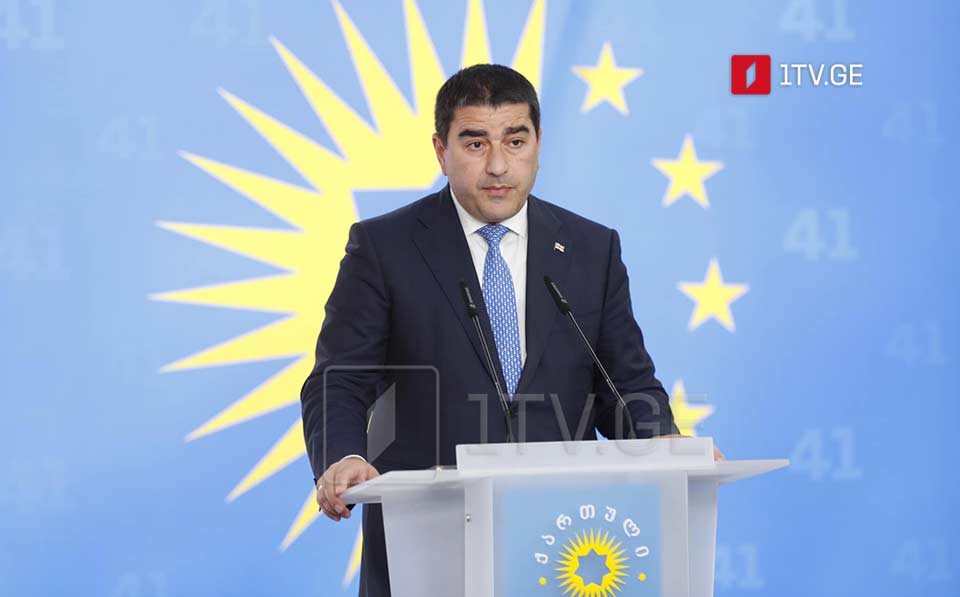
Georgian Speaker Shalva Papuashvili said that as promised to the Georgian people, one of the major steps after winning the 2024 parliamentary elections would be to start the legal procedure to ban the opposition United National Movement (UNM) party.
According to the Speaker, the initiation of a legal procedure to ban the party that violates the Constitution is a normal process in a democratic society.
Shalva Papuashvili further said he believed that banning the UNM would be the “beginning of the convalescence of our political system.”
Here is the Speaker’s statement in full:
“The motion by Germany’s major parties to ban the Alternative for Germany (AfD) party, which has the second highest support in the country, reveals the extent of political bias, if not hypocrisy, that some partners in Western countries, Germany included, exhibit towards the Georgian Government. In Germany, the Social Democrats and the Greens, along with some other like-minded opposition parties want to appeal to the Federal Constitutional Court with a request to ban AfD on the basis of the latter’s undermining of Germany’s free democratic order. This is not unheard of in some other countries.
A study from a few years ago found that 20 out of the 37 European democracies banned over 50 parties between 1945 and 2015 (Bourne/Casal). Ukraine banned the Communist party before and, more recently, disbanded the parties that menaced Ukraine’s democracy, independence, and territorial integrity. Moldova, another East European country, also banned an opposition political party for a ‘proximate threat to the democratic constitutional order.’ Our party, the Georgian Dream promised our electorate that after winning the October 2024 elections, we would move to appeal to the Constitutional Court to ban the United National Movement as a political party. Despite the analogies in democratic countries, our intention has been widely criticized by our foreign partners. This happened even if such legal initiative is in accordance with the law, has had precedents in democratic societies, and enjoys widespread support among the population.
The initiation of a legal procedure to ban the party that violates the Constitution is a normal process in a democratic society and should be taken as such, not necessarily as a sign of ‘backtracking’ or ‘backsliding’ democracy, which are the usual ready-made clichés always used by our foreign opponents while commenting on Georgian politics. The case is even more paradoxical if we take into account that AfD has never been in power in Germany. Logically, their only alleged crime is their rhetoric, or plans. While in case of Georgia, the UNM ruled the country for nine years and made itself notorious by numerous human rights violations.
The European Court of Human Rights in Strasbourg established in the “Ochigava v Georgia” case the existence of “systemic violence and torture” in penitentiary facilities during the UNM government. The key word here is the ‘system’, i.e. a pre-meditated, consciously built structure for oppression and intimidation, using massive physical and psychological violence. For these heavy crimes, up to 40 high-ranking officials were tried by the Court, among them former president Saakashvili himself, one former prime-minister and five former ministers. Moreover, while in opposition, UNM has continuously vowed to repeat those violations towards their opponents if they ever come back to power.
As an opposition party, the UNM distinguished itself, sadly, as a radical political force that has continuously called for deposing the legitimate government with illegitimate means, has refused to recognize the legitimacy of the outcome of every election since 2012, and has spewed the most fiery and polarizing political rhetoric among all Georgian radical parties. Georgia’s Constitution gives clear-cut criteria for banning a political party. It clearly states the following: “The establishment and activity of a political party that aims to overthrow or forcibly change the constitutional order of Georgia, infringe on the independence or violate the territorial integrity of the country, or that propagates war or violence or incites national, ethnic, provincial, religious or social strife, shall be inadmissible.” We, the Georgian Dream, are confident in overwhelming victory in the upcoming elections.
As we promised our people, one of the major steps after winning the elections is to start the legal procedure to ban the UNM. Our Constitution has clear guidelines for this case too: ‘The prohibition of a political party shall be admissible only by decision of the constitutional court, in cases defined by the organic law and in accordance with the established procedure.” As in every other democratic country, our Party too, has the constitutional right to initiate the case, however, the ultimate decision is in the Court’s hands. Georgian Court proved itself upright, professional, and objective in numerous contended cases (especially those of Rustavi 2 TV, Saakashvili, Gvaramia, Akhalaia, Melia, etc.), when Georgian judges were accused of political partisanship and bias. The European Court of Human Rights in Strasbourg upheld every single of this contended decision by the Georgian Court.
I would request our foreign partners, in particular, to be careful with meddling in Georgia’s judicial proceedings so that not to be perceived as interfering in the legal procedures of the Court and, thus, in the democratic process. Therefore, the Georgian Government, our society, and foreign partners should fully trust the judgement of the Court when it comes to banning of the UNM, which, I believe, would be the beginning of the convalescence of our political system,” he said.





